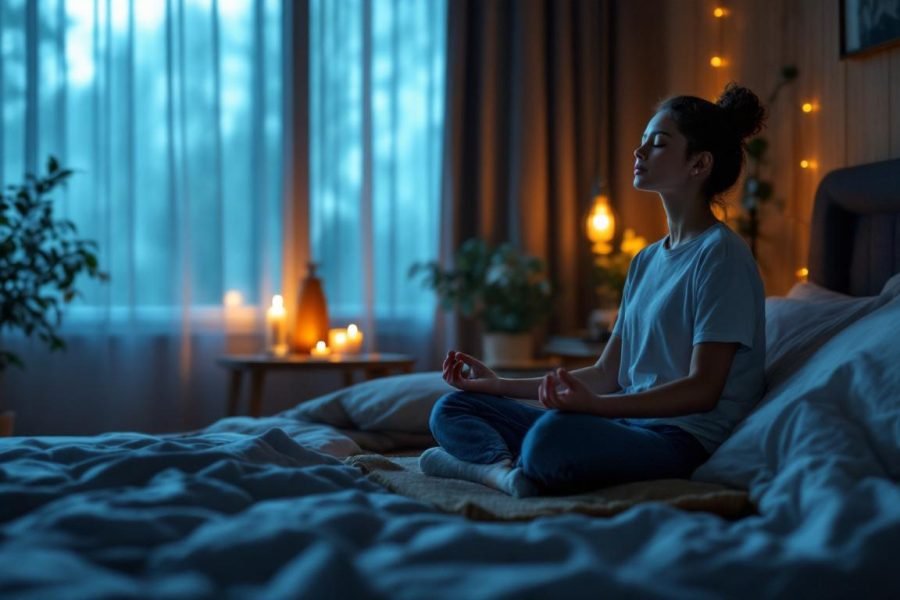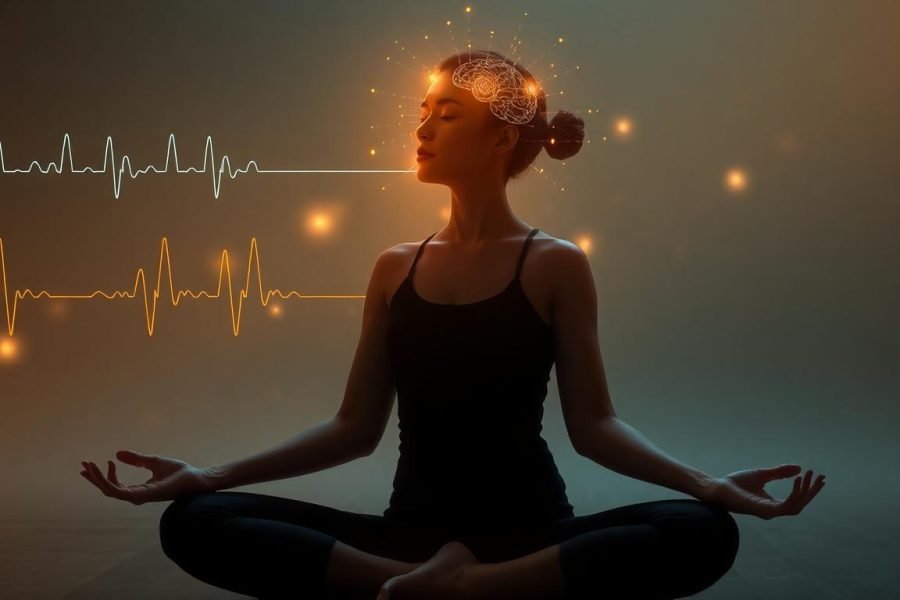Sleeping deeply is essential for restoring both body and mind. However, many face restless nights and wake up tired. Deep sleep meditation for profound sleep points to a natural, safe, and proven path for those seeking true rest.
Meditation, combined with breathing techniques and relaxing sounds, can transform sleep quality. Recent studies confirm the effectiveness of this practice in combating insomnia and stress. By including meditation in my nightly routine, I can create a calmer internal environment, favoring truly restorative sleep.
In this content, I share how the approach of deep sleep meditation for profound sleep is supported by evidence and offers lasting benefits. Understanding the concept of deep sleep, recognizing the importance of natural practices, and applying simple methods can change the way I approach my nights.
Understanding Deep Sleep and Its Benefits

Deep sleep is the key that differentiates a night of superficial rest from that invigorating feeling of waking up completely refreshed. When I apply practices like deep sleep meditation for profound sleep, I can access this more restorative phase of sleep.
Understanding how deep sleep works and what transformations it causes in the body and mind helps me value the ritual of sleeping even more, especially when I seek natural and integrative techniques.
What is Deep Sleep?
Deep sleep, also known as slow-wave sleep, occurs in the most advanced stages of the non-REM sleep cycle. In this phase, brain activity significantly decreases, heart rate drops, and breathing slows. It’s as if the entire body enters “maintenance” mode.
During this process, some points are fundamental:
- Release of growth hormone: important for tissue repair and cell regeneration.
- Memory consolidation: daily memories are organized and fixed.
- Metabolism reduction: helps the body save energy and regain balance.
When I manage to reach this depth of sleep, I notice that even my sensitivity to noise and light decreases significantly.
Benefits of Deep Sleep for Physical Health
Deep sleep is indispensable for the body to recover from daily efforts. Among the main benefits are:
- Muscle recovery: promotes the restructuring of muscles and tissues.
- Immune system strength: during deep sleep, proteins related to defense against infections are produced in greater quantities.
- Hormone regulation: balancing hormones like cortisol, ghrelin, and leptin contributes to better appetite control and reduced risk of metabolic diseases.
- Blood pressure reduction: the body relaxes, and pressures normalize, reducing cardiovascular risks.
These advantages only manifest when I get enough hours of quality sleep, which reinforces the importance of seeking natural methods like deep sleep meditation for profound sleep.
Benefits of Deep Sleep for Mental Health
There is a direct link between deep sleep and emotional balance. Good sleep impacts:
- Mood regulation: restless nights increase irritability and anxiety.
- Cognitive enhancement: creativity, reasoning, and learning are optimized during this phase.
- Consolidation of emotional memories: positive and negative experiences are processed, facilitating the overcoming of stress.
When I maintain a routine with quality deep sleep, I perceive greater mental clarity throughout the day.
Relationship Between Deep Sleep and Quality of Life
The quality of deep sleep is linked to clear indicators of well-being. A well-structured sleep routine translates into:
- Prevention of chronic diseases: those who sleep better have lower risks of diabetes, hypertension, and heart problems.
- Improved physical and mental performance: waking up refreshed favors exercise, concentration, and productivity.
- Emotional resilience: those who sleep with quality better resist daily stress.
This overview only confirms why investing in practices like deep sleep meditation for profound sleep changes the way I experience my quality of life, bringing balance in all areas.
Consequences of Lack of Deep Sleep
Neglecting deep sleep not only results in fatigue but also brings serious risks:
- Increased irritability and anxiety
- Decreased immunity
- Elevated risk of overweight and chronic diseases
- Impaired memory and focus
- Greater propensity for accidents
Therefore, prioritizing deep sleep, using natural strategies, is a choice for those who want not only to live longer but also with more energy and health.
How Meditation Contributes to Profound Sleep

Meditation has become one of the most recommended natural strategies for those seeking to promote deep and restorative sleep.
In recent years, scientific research and personal accounts have reinforced how the consistent practice of deep sleep meditation for profound sleep can act from relaxation to hormonal balance, creating an environment conducive to high-quality nights of rest. Below, I show how meditation impacts stress, the nervous system, and the very structure of sleep, bringing benefits that go far beyond simply lying in bed.
Reduction of Stress and Anxiety
One of the most common barriers to achieving deep sleep is the excess of stress and anxiety accumulated throughout the day. Worrisome situations keep the mind active and make it difficult to transition to a relaxed state, which is essential for natural sleep.
Several studies consistently show that meditation practice significantly reduces cortisol levels, known as the stress hormone. Lower cortisol levels directly reflect in body relaxation, facilitating the onset of deep sleep.
Meditation offers simple and effective tools to calm racing thoughts and promote serenity. Practices like mindfulness or conscious breathing, for example, help direct focus to the present, moving away from mental rumination and fears that often arise in the silence of the night. Thus, the brain learns to slow down, which favors:
- Fewer episodes of insomnia;
- Reduction of nocturnal awakenings;
- A sense of mental tranquility, even during periods of greater emotional pressure.
Meditating, for me, is like clearing my mind of the day’s uncertainties, creating space for the body to do its work of restoring and repairing during deep sleep.
Regulation of the Parasympathetic Nervous System
Deep sleep meditation for profound sleep also shows its strength when it comes to balancing the nervous system. The parasympathetic system is responsible for activating the body’s “rest and digest” mode.
Unlike the sympathetic system, which keeps us alert and ready to act, the parasympathetic system decreases heart rate, reduces blood pressure, and triggers muscle relaxation.
Various evidence demonstrates that meditative practices activate this system naturally. Just a few minutes focusing on breathing, for example, are enough to notice a physical and mental slowdown. This process prepares the body and mind for deep sleep.
The benefits of this relaxation are palpable:
- The body enters a state of real rest, essential for the restorative processes of deep sleep to occur.
- Hormonal levels adjust: there is a reduction in cortisol and an increase in melatonin, a key hormone for regulating the sleep cycle.
- Muscle tension decreases, making it easier to fall asleep and stay asleep for longer.
Practicing meditation before bed, for me, is like pressing an internal deceleration button, respecting the body’s natural rhythm.
Influence on Sleep Cycles and Dream Quality
Another clear advantage of deep sleep meditation for profound sleep is the improvement in natural sleep cycles and, consequently, in the quality of dreams.
Sleep is divided into different stages, and it is during deep sleep that true physical and mental regeneration occurs. When the mind does not receive stressful stimuli and worries, it moves more easily between sleep stages.
Science has already shown that those who meditate:
- Fall asleep faster and have more well-defined sleep cycles;
- Experience fewer nocturnal interruptions, waking up less throughout the night;
- Have longer phases of deep sleep, fundamental for body recovery.
Another interesting aspect is the hormonal regulation that occurs during the practice. Melatonin production increases, promoting better quality sleep, while serotonin balance in the brain provides less fragmented and more pleasant dreams.
With regular practice, I notice that I wake up less during the night and feel my mornings lighter, as if I had truly disconnected from the world for a few hours. Meditating before bed is, for me, an invitation for the sleep cycle to occur without obstacles, promoting not only physical rest but also lasting emotional balance.
The sum of these processes makes meditation one of the most complete methods for those who wish to experience deep sleep meditation for profound sleep, taking advantage of each sleep stage and ensuring a positive adaptation to daily stress.
Key Meditation Techniques for Deep Sleep

Among the strategies I’ve tried, deep sleep meditation for profound sleep practices are the simplest, most accessible, and effective. Each technique creates a more relaxed mental environment, reduces daily stress, and prepares the body for restorative sleep. Below, I present methods suitable for both beginners and those looking to enhance their nightly ritual.
Guided Meditation for Profound Sleep
Guided meditation is one of the most popular forms for those wishing to practice deep sleep meditation for profound sleep. Here, I use audios, videos, or apps where a facilitator guides me, step by step, through breathing exercises, visualization, and progressive relaxation.
This modality stands out for offering constant support: I don’t need to create anything from scratch; I just follow the voice or music and let myself go. Today, I easily find guided practices on platforms like Spotify, YouTube, and specialized apps (like Insight Timer and Calm). Typically, sessions involve:
- Guidance to slow down breathing
- Relaxing visualizations (calm beaches, forests, safe places)
- Simple muscle relaxation exercises
- Suggestions for letting go of worries
For a beginner, I recommend choosing sessions of 10 to 20 minutes. I keep the room dark, put on headphones, and follow the instructions until the end. Over time, I’ve noticed that my mind learns the path to tranquility, making it increasingly easier to enter deep sleep.
Mindfulness Techniques at Night
Mindfulness, or present moment awareness, has revolutionized how I deal with thoughts before bed. Here, the focus is entirely on the present, without judgment. I practice deep sleep meditation for profound sleep using two main methods: breath observation and body scan.
In breath observation, I sit or lie in a comfortable position and concentrate exclusively on the air entering and leaving my body. If my mind gets distracted (which is normal), I gently bring my focus back.
In the body scan exercise, I progressively bring my attention from my feet to my head, identifying and releasing tensions. It’s like scanning my body, relaxing one muscle at a time. The benefits of these techniques include:
- Reduced anxiety and “mental swirling” at bedtime
- Decreased cortisol, preparing the body for deep sleep
- Improved sleep quality, with fewer nocturnal awakenings
I try to set aside about 5 to 10 minutes for nightly mindfulness. The secret is consistency: the more I practice, the more efficient the process becomes.
Use of Therapeutic Sounds and Relaxing Music
Integrating sounds into my deep sleep meditation for profound sleep routine has greatly enriched my experience. Therapeutic sounds act as “sound anchors,” signaling to the brain that it’s time to slow down.
There are three main types of audio I use:
- Calm ambient music: soft melodies, without lyrics, that induce relaxation.
- Nature sounds: rain, wind, leaves, ocean waves, or bird songs create an immediate sense of peace.
- Special frequencies: audio with binaural beats (especially between 4 and 8 Hz) or 432 Hz tones, known for inducing deep states of relaxation.
My recommendation for beginners is to search for ready-made playlists on streaming apps or YouTube and test which type of sound brings the most calming effect. I keep the volume low and set an automatic shut-off so the music doesn’t disrupt my sleep cycle.
The integration of guided phrases, mindfulness, and sounds makes all the difference in deep sleep meditation for profound sleep. By adapting these practices to my profile, I feel that each night transforms into a natural invitation to deeper and more restorative sleep.
Tips for Creating a Relaxing Environment
For deep sleep meditation for profound sleep to be truly effective, I pay special attention to the environment where I practice and my nightly routine. I highlight the recommendations that have given me the best results:
- Create a relaxation routine: Try to meditate at the same time every day, signaling to your body that it’s time to slow down.
- Soft lighting: Prefer low, warm lights, which signal the arrival of night and stimulate natural melatonin production.
- Comfortable temperature: Keep the room at a mild temperature, between 18ºC and 22ºC (64-72°F), reducing nocturnal discomforts.
- Meditation apps: Apps like Zen, Calm, and Headspace offer quick sessions of mindfulness, breathing, and guided visualization. Just choose the “sleep” theme to find suitable content.
- Reduce electronic stimuli: Turn off screens at least 30 minutes before bedtime. Blue light harms natural sleep mechanisms.
- Practice sleep hygiene: Establish regular times to sleep and wake up, avoid caffeine at night, and invest in rituals like a warm bath or light reading.
The sum of these practices transforms the pre-sleep moment into a true ritual, facilitating the transition from the day’s agitation to a state of calm that promotes deep rest. Meditation, integrated with sleep hygiene and a welcoming environment, enhances each stage of this process, making restorative sleep a possible achievement every day.
Conclusion
Combining deep sleep meditation for profound sleep with relaxation practices is a safe, natural, and proven way to achieve truly restorative nights. The combination of guided meditation, therapeutic sounds, and simple breathing techniques reduces stress, calms the mind, and prepares the body for genuine rest that makes me wake up renewed.
I recommend that you choose one of the techniques presented today and put it into practice this week. Small changes can bring noticeable improvements in the first few days, making deep sleep an accessible achievement.
The best results come from consistency. If you want to advance, try different audios or methods until you find what best suits you. Thank you for dedicating your time to the pursuit of more health and balance. Share your experience or questions in the comments and be part of this transformation..






Deixe um comentário